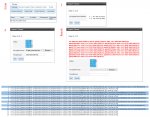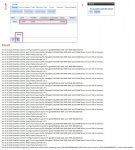- Config: FreeNAS-9.10.2-U4 on VMware ESXi 6.0 U3. 1 zPool = "Tank1" = 8 2-disk mirror vdevs (reference signature for all details), encrypted, no passphrase.
- Problem: Boot environment gone, attempted to import with recent config backup + recovery key (/data/GELI not available to restore).
- Attempt to resolve:

2. Import backup config (volume shown as locked) ... Attempt to unlock = Error due to no keyfile in /data/geli

3. Detach Volume, reboot, still no luck.
I believe if I had the /data/GELI keyfiles I would be OK, but I believe there is a way to rebuilt them somehow? Thank you for taking the time to read.
Code:
[root@FreeNAS] ~# zpool status pool: freenas-boot state: ONLINE scan: none requested config: NAME STATE READ WRITE CKSUM freenas-boot ONLINE 0 0 0 da0p2 ONLINE 0 0 0 errors: No known data errors
Code:
[root@FreeNAS] ~# gpart show => 34 16777149 da0 GPT (8.0G) 34 1024 1 bios-boot (512K) 1058 6 - free - (3.0K) 1064 16776112 2 freebsd-zfs (8.0G) 16777176 7 - free - (3.5K) => 34 11721045101 da1 GPT (5.5T) 34 94 - free - (47K) 128 11721045000 1 freebsd-zfs (5.5T) 11721045128 7 - free - (3.5K) => 34 11721045101 da2 GPT (5.5T) 34 94 - free - (47K) 128 11721045000 1 freebsd-zfs (5.5T) 11721045128 7 - free - (3.5K) => 34 11721045101 da3 GPT (5.5T) 34 94 - free - (47K) 128 11721045000 1 freebsd-zfs (5.5T) 11721045128 7 - free - (3.5K) => 34 11721045101 da4 GPT (5.5T) 34 94 - free - (47K) 128 11721045000 1 freebsd-zfs (5.5T) 11721045128 7 - free - (3.5K) => 34 11721045101 da5 GPT (5.5T) 34 94 - free - (47K) 128 11721045000 1 freebsd-zfs (5.5T) 11721045128 7 - free - (3.5K) => 34 11721045101 da6 GPT (5.5T) 34 94 - free - (47K) 128 11721045000 1 freebsd-zfs (5.5T) 11721045128 7 - free - (3.5K) => 34 11721045101 da7 GPT (5.5T) 34 94 - free - (47K) 128 11721045000 1 freebsd-zfs (5.5T) 11721045128 7 - free - (3.5K) => 34 11721045101 da8 GPT (5.5T) 34 94 - free - (47K) 128 11721045000 1 freebsd-zfs (5.5T) 11721045128 7 - free - (3.5K) => 34 11721045101 da9 GPT (5.5T) 34 94 - free - (47K) 128 11721045000 1 freebsd-zfs (5.5T) 11721045128 7 - free - (3.5K) => 34 11721045101 da10 GPT (5.5T) 34 94 - free - (47K) 128 11721045000 1 freebsd-zfs (5.5T) 11721045128 7 - free - (3.5K) => 34 11721045101 da11 GPT (5.5T) 34 94 - free - (47K) 128 11721045000 1 freebsd-zfs (5.5T) 11721045128 7 - free - (3.5K) => 34 11721045101 da12 GPT (5.5T) 34 94 - free - (47K) 128 11721045000 1 freebsd-zfs (5.5T) 11721045128 7 - free - (3.5K) => 34 11721045101 da13 GPT (5.5T) 34 94 - free - (47K) 128 11721045000 1 freebsd-zfs (5.5T) 11721045128 7 - free - (3.5K) => 34 11721045101 da14 GPT (5.5T) 34 94 - free - (47K) 128 11721045000 1 freebsd-zfs (5.5T) 11721045128 7 - free - (3.5K) => 34 11721045101 da15 GPT (5.5T) 34 94 - free - (47K) 128 11721045000 1 freebsd-zfs (5.5T) 11721045128 7 - free - (3.5K) => 34 11721045101 da16 GPT (5.5T) 34 94 - free - (47K) 128 11721045000 1 freebsd-zfs (5.5T) 11721045128 7 - free - (3.5K)
